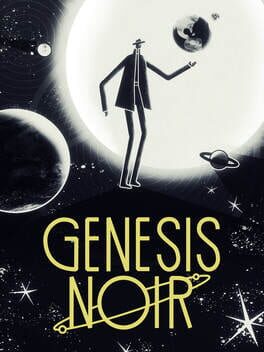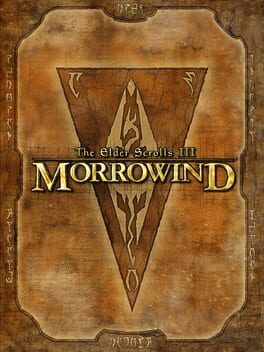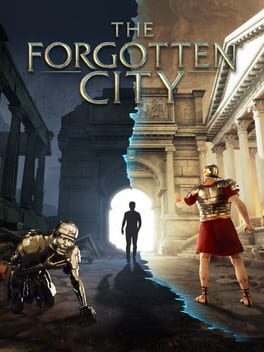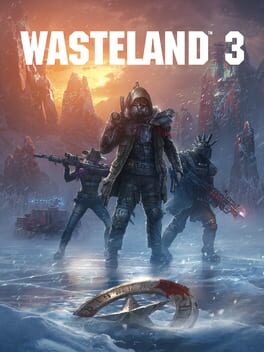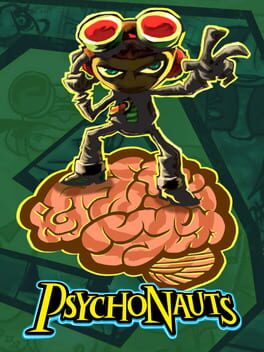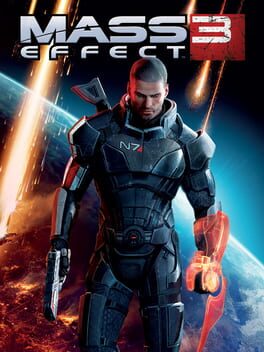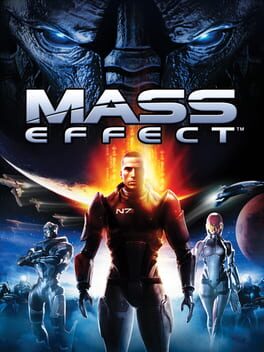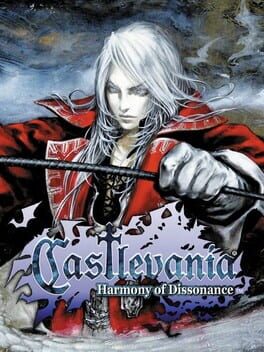plastichandgun
18 reviews liked by plastichandgun
Paradise Killer
2020
Paradise Killer nails its goal of presenting a loud, plastic, hyperfemme, vaporwave surface littered with ephemera and infused with the sinister air of modern mundanities and cosmic horror, reverberating in its musical molotov cocktail of brash city-pop and strangely melancholic downtempo synths that make up its criminally cool soundtrack. It's the most extra video game I've played in 2020.
The setting and lore are completely bonkers, the characters are larger-than-life with some sick-ass names like Lady Love Dies, Doctor Doom Jazz, and One Last Kiss, and the story takes some wild turns.
It's the only open-world detective game I've ever played, and it's impressive how much this non-linear approach actually works for this genre, especially coming from a studio that only made its debut with this title. The tool that keeps track of all your leads is super handy and crystal clear with its sorting method that I never got lost of each thread in the game's vast web of mystery even when I took some days off between sessions throughout my 17 hours with the game.
People also weren't kidding about how much of a platformer this actually is. That aspect mostly works, although I have an incredibly tiny nitpick about how your momentum when jumping forward really doesn't make for precise platforming.
I'm not as down on the climax that some people seem to be from what I've heard and read, because while mechanically it's actually pretty straightforward unlike, say, the trial sections in the Ace Attorney series, it does reflect the open-ended nature of the game and its themes of distinguishing facts from truths and fairness from justice and the pettiness of people in power. It's also just satisfying to lay down as tight of a case as possible that you built with some real hard-nosed investigating and watch uppity conspiratorial assholes with their manicured facades crumble!
I do think it would have been good for the game to give you an idea of how the trial would work. 100% agreed on the general sentiment I've seen from others who've played the game that had I known the trial's structure, I maybe would have made different choices to spare a couple of characters.
If there's one other big thing I wish the game did, it would have been to make the characters more reactive to actions and dialogue choices you make. I'm sure that would have been infinitely more complex to attempt and would probably make solving the mystery even harder if, say, you get locked out of certain information if you overstep your boundaries or say the wrong thing, but I think it would have made for a way more interesting game and emphasized the importance of building relationships and navigating truths that its themes touch on.
Still, given how intricate the plot is and how the investigative experience still works with pacing peaks and valleys despite its open-world structure, there's a lot of praise to be given to Kaizen Game Works for achieving their own set of narrative and gameplay ambitions.
The setting and lore are completely bonkers, the characters are larger-than-life with some sick-ass names like Lady Love Dies, Doctor Doom Jazz, and One Last Kiss, and the story takes some wild turns.
It's the only open-world detective game I've ever played, and it's impressive how much this non-linear approach actually works for this genre, especially coming from a studio that only made its debut with this title. The tool that keeps track of all your leads is super handy and crystal clear with its sorting method that I never got lost of each thread in the game's vast web of mystery even when I took some days off between sessions throughout my 17 hours with the game.
People also weren't kidding about how much of a platformer this actually is. That aspect mostly works, although I have an incredibly tiny nitpick about how your momentum when jumping forward really doesn't make for precise platforming.
I'm not as down on the climax that some people seem to be from what I've heard and read, because while mechanically it's actually pretty straightforward unlike, say, the trial sections in the Ace Attorney series, it does reflect the open-ended nature of the game and its themes of distinguishing facts from truths and fairness from justice and the pettiness of people in power. It's also just satisfying to lay down as tight of a case as possible that you built with some real hard-nosed investigating and watch uppity conspiratorial assholes with their manicured facades crumble!
I do think it would have been good for the game to give you an idea of how the trial would work. 100% agreed on the general sentiment I've seen from others who've played the game that had I known the trial's structure, I maybe would have made different choices to spare a couple of characters.
If there's one other big thing I wish the game did, it would have been to make the characters more reactive to actions and dialogue choices you make. I'm sure that would have been infinitely more complex to attempt and would probably make solving the mystery even harder if, say, you get locked out of certain information if you overstep your boundaries or say the wrong thing, but I think it would have made for a way more interesting game and emphasized the importance of building relationships and navigating truths that its themes touch on.
Still, given how intricate the plot is and how the investigative experience still works with pacing peaks and valleys despite its open-world structure, there's a lot of praise to be given to Kaizen Game Works for achieving their own set of narrative and gameplay ambitions.
Genesis Noir
2021
Rarely have I played a game that's made me more intensely question why it's a game. I was attracted to Genesis Noir by its visual style, and that turns out to be about the only thing this game has going for it... so why not just make it a cartoon instead? The interactivity in the game ranges from "press forward to progress the plot" to "click arbitrarily around the screen until you figure out what obscure thing you're supposed to do to progress the plot", and never once does it justify having interactive components at all.
Fortunately for those who might feel obligated to play it anyway, the plot does nothing to make up for the mechanical unsophistication. The jumble of biblical and scientific metaphors are too arbitrary to have anything interesting to say and too obvious to be intriguing. They act like a mountain of unflavored buttercream frosting, hiding the fact that the paint-by-numbers noir plot underneath has barely anything going on at all.
Fortunately for those who might feel obligated to play it anyway, the plot does nothing to make up for the mechanical unsophistication. The jumble of biblical and scientific metaphors are too arbitrary to have anything interesting to say and too obvious to be intriguing. They act like a mountain of unflavored buttercream frosting, hiding the fact that the paint-by-numbers noir plot underneath has barely anything going on at all.
with winter having arrived and snow on the ground, i've been stricken with an urge to play a bunch of skyrim... largely to try some mods i've long been curious about, like the fully voiced and uniquely smart and funny khajiit companion, inigo. my character is one with a background in thievery and a curiosity for the arcane, now become a full-on wizard complimented by magic of stealth: silencing illusion spells and conjured bows... having long thought of skyrim as the most restrictive of the elder scrolls especially with regard to magical creativity, i'm discovering there's more to it than i'd known. naturally, this brings about a need to talk about one of my favorite games:
morrowind.
actually, i really want to talk about both. i want to talk about the nature of roleplay in these games, and what it means to inhabit these characters of our own making and imagining. see, there's been plenty of debate as to whether bethesda care any longer about making 'true' rpgs, having in many ways simplified the experience on a granular level, depriving the player more and more of their options and ownership over the experience of playing their games. i do think there's a lot of truth to this, though i feel there's more to be said.
getting to the point... before considering all the differences in the systems—how you build your character and develop their skills, defining their nature through mechanics and so forth—we have to consider the very concept of these characters, the intentions at work before we get involved. i'm setting oblivion aside here because it's a bit of an outlier in that you fill the shoes of an interloper, while the "real hero" of the story (the one who'll be remembered in the history books) is martin. in skyrim, you're meant to be the dragonborn, undeniably enjoying the favor of the gods unless you deliberately avoid the main quest (perhaps even going as far as installing an alternate start mod so you can just be a bandit in the wilderness or a fisherman or whatever). in my current run through the game (more like run around, given how these work) i've decided to embrace this blessing and use it to better the situation in skyrim as much as i can. my traveling companions are a vampire princess (my gay wife) and a recovering skooma fiend. (the latter is entirely a mod creation, while the former is augmented by several mods and they interact with voiced dialogue and radiant ai conversations and everything!) so, getting to morrowind: things are considerably more ambiguous and complicated, here. i'm going to keep it somewhat short because i'd prefer not to ruin the experience for anyone interested in giving the game a try—suffice to say the whole matter of whether you're any kind of chosen one is up for debate, and the range and options you have in the course of defining who your character is are considerably... more. or, well. at least it seems to be that way. it largely is... but it's also just different.
your choices in skyrim are essentially reduced to yes or no: yes, i will explore this destiny as dragonborn. no, i will not. yes, i will go to the college of winterhold and become arch-mage, or no, i'd rather not do that and perhaps instead become a nightingale, master of thieves. of course, you can choose to do all of these things—or to do none of them. and it sometimes does go further than that, such as when faced with the matter of joining the dark brotherhood. (i'm going to spoil some things here, so skip to the next paragraph if you'd rather avoid that.) having taken it upon yourself to murder the terrible, abusive matron of the orphanage in riften at the request of a young boy calling upon the infamous death cult, their leader eventually abducts you and locks you in a cabin with three blindfolded strangers, tells you that one of them has a contract on their head, and forces you into deciding which one to kill. a cruel initiation. (an interesting note is that the clairvoyance spell points toward one of them, though there's no other indication of which would be the correct choice, if any.) you have one alternative: kill your captor, free the others, and set about laying waste to the entire dark brotherhood. this is an actual questline, its availability as a path of action not readily apparent given the gravity of the situation—a bit of thinking on your feet is required to discover this. it's not always easy to stumble into these sort of options given the nature of questing in skyrim, where you're typically pulled along by quest markers... but they are there, and it's always refreshing.
morrowind is another beast entirely. beyond acceptance or denial, the matter of how you proceed is dramatically more self-driven. there are no quest markers. rarely will an npc tell you exactly where to go, and even when they do it's up to you to find your way. and then there's the question of how you'll go about accomplishing whatever task, left entirely up to you. you're not just an adventurer or a mercenary—you're an investigator. you keep a journal describing most of your interactions and observations in the game itself, and it's never a bad idea to keep notes of your own outside of the game. i've seen plenty of others describe dialogue as a bunch of wiki pages or whatever, entirely boring and so forth, but holy shit do i feel the exact opposite. i don't think there's any other game that fills me with such a desire to delve into its world and learn everything i can to understand its nature, its history, its people, and my role among them. reincarnation of a legend or not—and it's up to you to decide, not just via yes or no, but in the text, in your imagination, your headcanon, in the details. my favorite nerevarine is an iconoclastic wanderer who feels empowered by her otherwise bewildering involvement with the blades and, as an outlander to native dunmer 'culture', places the eradication of the enslavement of the khajiit and argonian races high on her list of motivations. becoming a demigod through her own efforts (albeit guided by prophecy) is just the icing on the cake. you could play through (in, around) morrowind a dozen times and find a new path, deepen the path(s) you've previously found interesting or exciting... it's just a game that makes me dream like no other.
also, you can (if you so choose) eventually craft spells that let you jump across the entire island of vvardenfell. or simply fly. you can't levitate at all in these other games! (well... without mods.)
i'm really enjoying my time with skyrim right now, and i think i've found a way to play a role i find fulfilling and comfortable with my own personality... but these games always lead back to morrowind, for me. it won't be long before i feel the pull back to vvardenfell once more.
morrowind.
actually, i really want to talk about both. i want to talk about the nature of roleplay in these games, and what it means to inhabit these characters of our own making and imagining. see, there's been plenty of debate as to whether bethesda care any longer about making 'true' rpgs, having in many ways simplified the experience on a granular level, depriving the player more and more of their options and ownership over the experience of playing their games. i do think there's a lot of truth to this, though i feel there's more to be said.
getting to the point... before considering all the differences in the systems—how you build your character and develop their skills, defining their nature through mechanics and so forth—we have to consider the very concept of these characters, the intentions at work before we get involved. i'm setting oblivion aside here because it's a bit of an outlier in that you fill the shoes of an interloper, while the "real hero" of the story (the one who'll be remembered in the history books) is martin. in skyrim, you're meant to be the dragonborn, undeniably enjoying the favor of the gods unless you deliberately avoid the main quest (perhaps even going as far as installing an alternate start mod so you can just be a bandit in the wilderness or a fisherman or whatever). in my current run through the game (more like run around, given how these work) i've decided to embrace this blessing and use it to better the situation in skyrim as much as i can. my traveling companions are a vampire princess (my gay wife) and a recovering skooma fiend. (the latter is entirely a mod creation, while the former is augmented by several mods and they interact with voiced dialogue and radiant ai conversations and everything!) so, getting to morrowind: things are considerably more ambiguous and complicated, here. i'm going to keep it somewhat short because i'd prefer not to ruin the experience for anyone interested in giving the game a try—suffice to say the whole matter of whether you're any kind of chosen one is up for debate, and the range and options you have in the course of defining who your character is are considerably... more. or, well. at least it seems to be that way. it largely is... but it's also just different.
your choices in skyrim are essentially reduced to yes or no: yes, i will explore this destiny as dragonborn. no, i will not. yes, i will go to the college of winterhold and become arch-mage, or no, i'd rather not do that and perhaps instead become a nightingale, master of thieves. of course, you can choose to do all of these things—or to do none of them. and it sometimes does go further than that, such as when faced with the matter of joining the dark brotherhood. (i'm going to spoil some things here, so skip to the next paragraph if you'd rather avoid that.) having taken it upon yourself to murder the terrible, abusive matron of the orphanage in riften at the request of a young boy calling upon the infamous death cult, their leader eventually abducts you and locks you in a cabin with three blindfolded strangers, tells you that one of them has a contract on their head, and forces you into deciding which one to kill. a cruel initiation. (an interesting note is that the clairvoyance spell points toward one of them, though there's no other indication of which would be the correct choice, if any.) you have one alternative: kill your captor, free the others, and set about laying waste to the entire dark brotherhood. this is an actual questline, its availability as a path of action not readily apparent given the gravity of the situation—a bit of thinking on your feet is required to discover this. it's not always easy to stumble into these sort of options given the nature of questing in skyrim, where you're typically pulled along by quest markers... but they are there, and it's always refreshing.
morrowind is another beast entirely. beyond acceptance or denial, the matter of how you proceed is dramatically more self-driven. there are no quest markers. rarely will an npc tell you exactly where to go, and even when they do it's up to you to find your way. and then there's the question of how you'll go about accomplishing whatever task, left entirely up to you. you're not just an adventurer or a mercenary—you're an investigator. you keep a journal describing most of your interactions and observations in the game itself, and it's never a bad idea to keep notes of your own outside of the game. i've seen plenty of others describe dialogue as a bunch of wiki pages or whatever, entirely boring and so forth, but holy shit do i feel the exact opposite. i don't think there's any other game that fills me with such a desire to delve into its world and learn everything i can to understand its nature, its history, its people, and my role among them. reincarnation of a legend or not—and it's up to you to decide, not just via yes or no, but in the text, in your imagination, your headcanon, in the details. my favorite nerevarine is an iconoclastic wanderer who feels empowered by her otherwise bewildering involvement with the blades and, as an outlander to native dunmer 'culture', places the eradication of the enslavement of the khajiit and argonian races high on her list of motivations. becoming a demigod through her own efforts (albeit guided by prophecy) is just the icing on the cake. you could play through (in, around) morrowind a dozen times and find a new path, deepen the path(s) you've previously found interesting or exciting... it's just a game that makes me dream like no other.
also, you can (if you so choose) eventually craft spells that let you jump across the entire island of vvardenfell. or simply fly. you can't levitate at all in these other games! (well... without mods.)
i'm really enjoying my time with skyrim right now, and i think i've found a way to play a role i find fulfilling and comfortable with my own personality... but these games always lead back to morrowind, for me. it won't be long before i feel the pull back to vvardenfell once more.
The Forgotten City
2021
A minor triumph of a game. There are minor quibbles to be made but most of them are of the idle "wouldn't it be cool if it did this too/instead/more?" type. The way all the pieces unfold is just so smooth and interesting and satisfying. The balance of exploration, dialogue, and problem solving, the drip of new twists and revelations, the variety of ideas brought together in this concept and the way they interact, is all just excellent. It kept me compelled to sit and play the whole thing in one sitting.
My initial impression from spoiler-lite pitches from people like Super Bunnyhop was that the main draw here was the well-researched classical setting and the thoughtful metaethical discourse. For me, while the setting is gorgeous and very well detailed, those are nice features but certainly not enough to hang a game on. You could imagine a game that could maybe deliver on one or the other in a way that could compete with other sources, but it's a pretty high bar and Forgotten City certainly doesn't hit it for either. The thing that made it work for me is that the cast is pretty richly composed of people who feel like people, trying to puzzle their way through the ethics of an ecological situation very different from ours. There are some kind of arbitrary binnings in the way the game treats cultures at the scale of the big area design and game mechanics I don't like, but each character belies that by bringing a very unique cross-section of cultural and geographical, as well as personal, experiences to the table. I can't help but wonder if it's a coincidence that this game has such a similar premise to Jo Walton's Thessaly series, which tickled me in that same way. On top of that, there are dimensions of the premise that kept making it more interesting to me until more or less the very end. It's not a "mindfuck" story exactly but it certainly recontextualizes itself in some major ways as it goes on.
As for quibbles, I went into this hoping for a very thinky puzzle experience, something like Outer Wilds X Obra Dinn, where I'd have to learn a lot about the cast and their relationships through careful inference and observation of their interactions and devise a strategy that brought all that knowledge to bear at once to achieve different outcomes. Instead it turns out there are few moments you when exploring a bit more and poking a few dialogue trees doesn't make things fairly obvious. And unlike Outer Wilds, there are mechanics in the game that automate putting the knowledge you gain into action, so it's not a pure "epistemological roguelike" in that sense. The structure is less like a puzzle game than an exquisitely interlinked set of RPG sidequests, the sort of density of compellingly written stuff I've always wanted from Bioware or Elder Scrolls sorts of games (or most recently eg Prey), but which the scope and freedom of their games never allowed them to pursue.
That's what makes Forgotten City feel like such a triumph to me. It has the whole toolkit of Skyrim available mechanically, but it's free to apply it how and when and where it chooses to achieve exactly the overall effect it's going for. The game feels so perfectly keyed in to deliver this weird and creative and thoughtful artistic vision. It's just a joy to see a small team have the chance to do that, not in one of the traditional indie genres but in an area usually reserved for AAA studios, and pull it off so elegantly.
The other noteworthy element I found underwhelming constitutes a major late game spoiler so I won't detail it. It's both a trope I dislike and an execution that kind of abruptly deflates some of the complexity the game builds up to that point. Similarly, it promises only a small number of divergent endings and seems to invite you to get them all, but I didn't find two of the three I got distinct enough to merit the effort of going back for the other. The epilogue makes up for it, and those are minor quibbles overall though.
My initial impression from spoiler-lite pitches from people like Super Bunnyhop was that the main draw here was the well-researched classical setting and the thoughtful metaethical discourse. For me, while the setting is gorgeous and very well detailed, those are nice features but certainly not enough to hang a game on. You could imagine a game that could maybe deliver on one or the other in a way that could compete with other sources, but it's a pretty high bar and Forgotten City certainly doesn't hit it for either. The thing that made it work for me is that the cast is pretty richly composed of people who feel like people, trying to puzzle their way through the ethics of an ecological situation very different from ours. There are some kind of arbitrary binnings in the way the game treats cultures at the scale of the big area design and game mechanics I don't like, but each character belies that by bringing a very unique cross-section of cultural and geographical, as well as personal, experiences to the table. I can't help but wonder if it's a coincidence that this game has such a similar premise to Jo Walton's Thessaly series, which tickled me in that same way. On top of that, there are dimensions of the premise that kept making it more interesting to me until more or less the very end. It's not a "mindfuck" story exactly but it certainly recontextualizes itself in some major ways as it goes on.
As for quibbles, I went into this hoping for a very thinky puzzle experience, something like Outer Wilds X Obra Dinn, where I'd have to learn a lot about the cast and their relationships through careful inference and observation of their interactions and devise a strategy that brought all that knowledge to bear at once to achieve different outcomes. Instead it turns out there are few moments you when exploring a bit more and poking a few dialogue trees doesn't make things fairly obvious. And unlike Outer Wilds, there are mechanics in the game that automate putting the knowledge you gain into action, so it's not a pure "epistemological roguelike" in that sense. The structure is less like a puzzle game than an exquisitely interlinked set of RPG sidequests, the sort of density of compellingly written stuff I've always wanted from Bioware or Elder Scrolls sorts of games (or most recently eg Prey), but which the scope and freedom of their games never allowed them to pursue.
That's what makes Forgotten City feel like such a triumph to me. It has the whole toolkit of Skyrim available mechanically, but it's free to apply it how and when and where it chooses to achieve exactly the overall effect it's going for. The game feels so perfectly keyed in to deliver this weird and creative and thoughtful artistic vision. It's just a joy to see a small team have the chance to do that, not in one of the traditional indie genres but in an area usually reserved for AAA studios, and pull it off so elegantly.
The other noteworthy element I found underwhelming constitutes a major late game spoiler so I won't detail it. It's both a trope I dislike and an execution that kind of abruptly deflates some of the complexity the game builds up to that point. Similarly, it promises only a small number of divergent endings and seems to invite you to get them all, but I didn't find two of the three I got distinct enough to merit the effort of going back for the other. The epilogue makes up for it, and those are minor quibbles overall though.
Wasteland 3
2020
The best post-apocalyptic RPG ever made. Whether you've played the other games in the series or not, you'll enjoy this game if you're a fan of party-based RPGs.
There are many different ways to approach situations in Wasteland 3, both in and out of combat. Skill checks, reputation, companions and past choices all contribute to how things will play out. And when I say choices matter, they really, really matter. A simple decision you made hours ago can come back around to bite you, or help you, later on. There's almost never a purely 'good' outcome, and moral decisions are a lot greyer than in other RPGs.
As someone who's not really a fan of turn-based Action Point combat, I still really enjoyed the combat in this game. With complete flexibility in how you set up your squad, you can approach combat however you want. Hack or disable robots and turrets to give you an edge, use the environment to your advantage, or just brute force your way through it all. The choice is yours.
The game's presentation is also excellent. Fantastic sound design, voice acting and music with great visuals. Quests are mostly well constructed, and it's clear the focus was on quality rather than quantity since there's not too many side quests, but they're all substantial and fleshed out.
All in all, a brilliant game for fans of tactical RPGs, or anyone who's looking for a good post-apocalyptic game with a great story, characters and combat.
There are many different ways to approach situations in Wasteland 3, both in and out of combat. Skill checks, reputation, companions and past choices all contribute to how things will play out. And when I say choices matter, they really, really matter. A simple decision you made hours ago can come back around to bite you, or help you, later on. There's almost never a purely 'good' outcome, and moral decisions are a lot greyer than in other RPGs.
As someone who's not really a fan of turn-based Action Point combat, I still really enjoyed the combat in this game. With complete flexibility in how you set up your squad, you can approach combat however you want. Hack or disable robots and turrets to give you an edge, use the environment to your advantage, or just brute force your way through it all. The choice is yours.
The game's presentation is also excellent. Fantastic sound design, voice acting and music with great visuals. Quests are mostly well constructed, and it's clear the focus was on quality rather than quantity since there's not too many side quests, but they're all substantial and fleshed out.
All in all, a brilliant game for fans of tactical RPGs, or anyone who's looking for a good post-apocalyptic game with a great story, characters and combat.
Psychonauts
2005
So after 2, I went back to original Psychonauts and had an absolute blast.
It goes without saying that this is a much rougher game than 2. Part of that is budgetary, but part of it is that it's also 16 years old - game design has moved on a lot since 2005, it turns out, even in the relatively dead 3d platformer genre.
There's a lives system, which is weird and inconsistent. The difficulty curve is more like a difficulty heart rate. The Meat Circus sucks massive donkey dick. There's a point of no return, but if you only save in a single file, you can never exit the final mind, and there isn't a post-game revisit to the hub. Guess I'll never talk to the kids after handing back their minds. Oh well!
That's quibbly though. Psychonauts is wildly creative and has some levels that even 16 years on blew my socks clean off. Everyone recommends the Milkman Conspiracy, and that is a banger, but Waterloo is equally up there for me.
The writing is quippier than 2, and is packed full of easily missable jokes from optional interactions. Clairvoyance is still extremely funny.
A great time, all told, and still holds up surprisingly well - even if going back to its rough edges after 2's laser-precision design can be a bit of a shock. Highly recommend.
It goes without saying that this is a much rougher game than 2. Part of that is budgetary, but part of it is that it's also 16 years old - game design has moved on a lot since 2005, it turns out, even in the relatively dead 3d platformer genre.
There's a lives system, which is weird and inconsistent. The difficulty curve is more like a difficulty heart rate. The Meat Circus sucks massive donkey dick. There's a point of no return, but if you only save in a single file, you can never exit the final mind, and there isn't a post-game revisit to the hub. Guess I'll never talk to the kids after handing back their minds. Oh well!
That's quibbly though. Psychonauts is wildly creative and has some levels that even 16 years on blew my socks clean off. Everyone recommends the Milkman Conspiracy, and that is a banger, but Waterloo is equally up there for me.
The writing is quippier than 2, and is packed full of easily missable jokes from optional interactions. Clairvoyance is still extremely funny.
A great time, all told, and still holds up surprisingly well - even if going back to its rough edges after 2's laser-precision design can be a bit of a shock. Highly recommend.
Psychonauts
2005
Flirts SO CLOSELY with perfection. Bad audio mixing and some ass-quality final levels/boss fight kneecap what is otherwise a flawless marathon of inventive 3D platforming. This game soars on its phenomenal and unique premise. The triple threat of Milkman Conspiracy, Gloria's Theater, and Waterloo World are some of the finest levels in 3D platforming history. This universe and its characters are all winners, and I loved every minute spent with them. An absolute must play for 3D platforming enthusiasts.
Mass Effect 3
2012
There's a common consensus that the ending of Mass Effect 3 was what's bad, and that everything beforehand was actually pretty good. Understandable at that may be, I completely disagree with it. Mass Effect 3 was not just the culmination of the game's own problems, it was the culmination of the entire trilogy's problems. It was the ticking time bomb that was destined to blow up in everybody's faces, one way or another.
While it's very easy (but very accurate) to blame Mass Effect 3 on EA, I think most of it's core problems are also to be blamed on BioWare for how they helped put it into a tight corner over the course of 3 games. The over-reliance on set-up in the first two games, the over-ambitious scale, the weightless choice and consequences, confused mismatch of RPG and shooter mechanics, the need to streamline all of it paved the way for something like Mass Effect 3 to limp its half-dead body to the finish line. Only barely making it as someone shows up and pulls the trigger by surprise. Killing it before it had the chance to ever shine.
Auto-dialogue is at an all-time high to the point there's even an option in the menu to remove any choices you make in dialogue so everything plays out like a really long cutscene. The interactivity is almost completely gutted out and gone, exploring worlds is never as engaging anymore. There's too many loading screens to get from a simple point A to point B (looking at you Normandy). There's hardly any real side-quests other than eavesdropping on people in the Citadel, or doing multiplayer maps which are actually required in order to get the best possible ending.
There's a couple of good moments with long-time and beloved characters like Garrus, Liara, Mordin, or Wrex that are all actually pretty solid...inspite of being roped up into lazy big action emotional set-pieces that don't make sense at all if you think about it for more than 10 seconds. Most of the characters in Mass Effect 2, easily the best part (even if it's not saying much), are completely sidelined from the plot. Which is incredibly disappointing because it seemed like they would be far more important to Shepard and be involved in the war against the Reapers.
The combat is the best of the trilogy, too bad the newly designed cover system blows massive chunks. Whenever I want to dodge or evade enemy attacks, the game has a habit of registering it as hiding behind an object to take cover, or some dodge roll. Making the gameplay all the more tedious whenever swarms of enemies spawn, which is often.
The last couple hours of the game are some of the worst I've experienced while playing a video game. Gameplay wise, it's just a massive rinse and repeat of spawning swarms of ridiculously unbalanced enemies at you, to the point "covering" doesn't even work anymore and is rendered useless.
I'm not going to pretend that I have some deep passionate love for Mass Effect, because I really don't. But that last 10 or so minutes is still a massive slap in the face for retconning the entire point of the trilogy by shoehorning some last-minute Organic vs Synthetic conflict which was very clearly never the main focus. And the game forces you to choose one over the other, even though a third option where both can coexist without violence is very plausible since in the game you can literally do that with two alien species who were at war with each-other. I shot the Star Child and I got the bad ending, which I didn't care at all because I found out all the other endings are exactly the same except with couple seconds of different footage.
None of the choices you've made in the trilogy so far really factor in to these endings. The game doesn't care. Starchild doesn't care. It all lends to the exact same endpoint for anybody playing, barring the color of an explosion changing.
Worst of all, I don't even care anymore.
While it's very easy (but very accurate) to blame Mass Effect 3 on EA, I think most of it's core problems are also to be blamed on BioWare for how they helped put it into a tight corner over the course of 3 games. The over-reliance on set-up in the first two games, the over-ambitious scale, the weightless choice and consequences, confused mismatch of RPG and shooter mechanics, the need to streamline all of it paved the way for something like Mass Effect 3 to limp its half-dead body to the finish line. Only barely making it as someone shows up and pulls the trigger by surprise. Killing it before it had the chance to ever shine.
Auto-dialogue is at an all-time high to the point there's even an option in the menu to remove any choices you make in dialogue so everything plays out like a really long cutscene. The interactivity is almost completely gutted out and gone, exploring worlds is never as engaging anymore. There's too many loading screens to get from a simple point A to point B (looking at you Normandy). There's hardly any real side-quests other than eavesdropping on people in the Citadel, or doing multiplayer maps which are actually required in order to get the best possible ending.
There's a couple of good moments with long-time and beloved characters like Garrus, Liara, Mordin, or Wrex that are all actually pretty solid...inspite of being roped up into lazy big action emotional set-pieces that don't make sense at all if you think about it for more than 10 seconds. Most of the characters in Mass Effect 2, easily the best part (even if it's not saying much), are completely sidelined from the plot. Which is incredibly disappointing because it seemed like they would be far more important to Shepard and be involved in the war against the Reapers.
The combat is the best of the trilogy, too bad the newly designed cover system blows massive chunks. Whenever I want to dodge or evade enemy attacks, the game has a habit of registering it as hiding behind an object to take cover, or some dodge roll. Making the gameplay all the more tedious whenever swarms of enemies spawn, which is often.
The last couple hours of the game are some of the worst I've experienced while playing a video game. Gameplay wise, it's just a massive rinse and repeat of spawning swarms of ridiculously unbalanced enemies at you, to the point "covering" doesn't even work anymore and is rendered useless.
I'm not going to pretend that I have some deep passionate love for Mass Effect, because I really don't. But that last 10 or so minutes is still a massive slap in the face for retconning the entire point of the trilogy by shoehorning some last-minute Organic vs Synthetic conflict which was very clearly never the main focus. And the game forces you to choose one over the other, even though a third option where both can coexist without violence is very plausible since in the game you can literally do that with two alien species who were at war with each-other. I shot the Star Child and I got the bad ending, which I didn't care at all because I found out all the other endings are exactly the same except with couple seconds of different footage.
None of the choices you've made in the trilogy so far really factor in to these endings. The game doesn't care. Starchild doesn't care. It all lends to the exact same endpoint for anybody playing, barring the color of an explosion changing.
Worst of all, I don't even care anymore.

